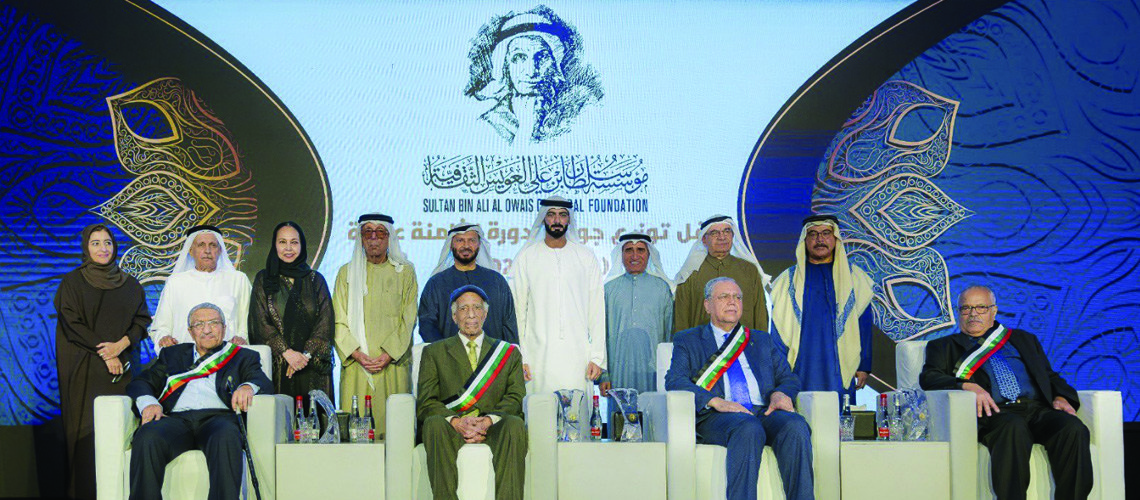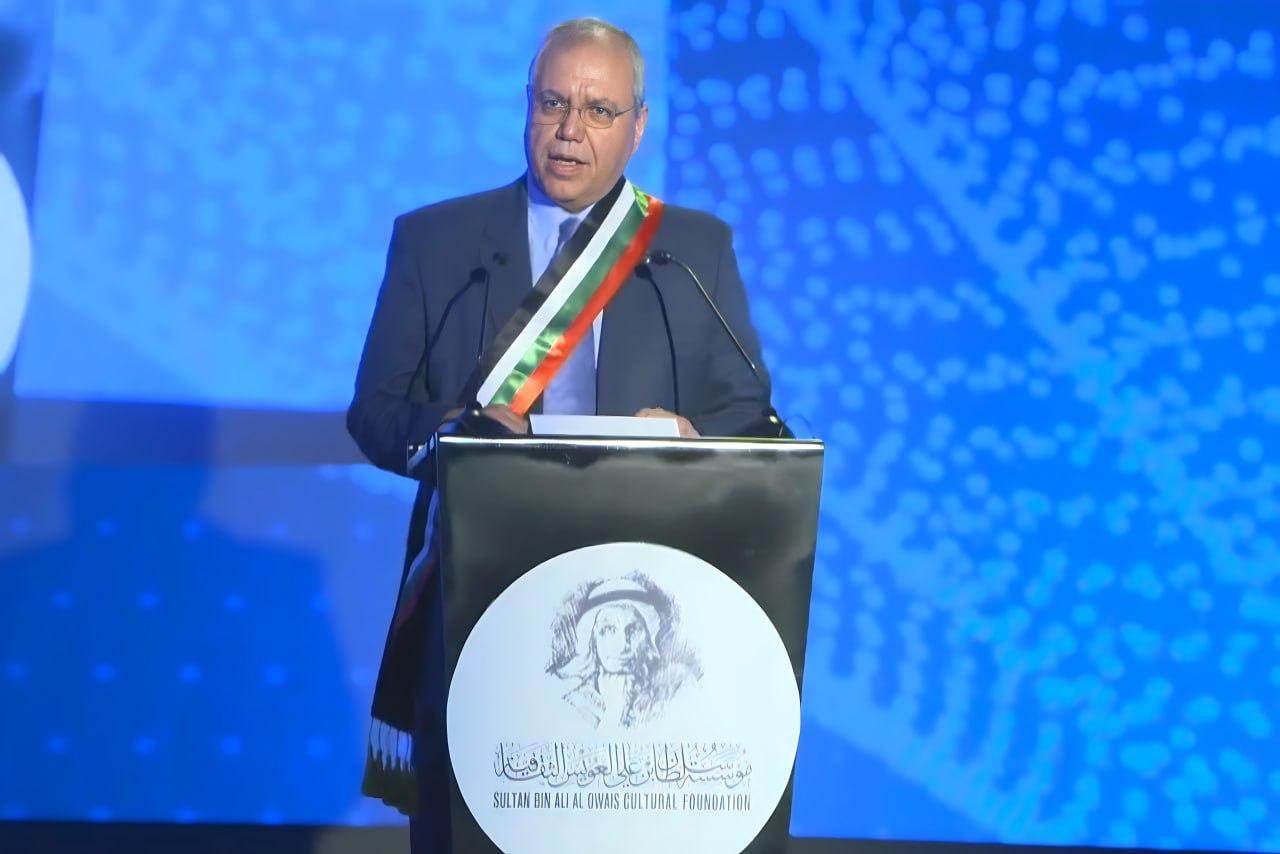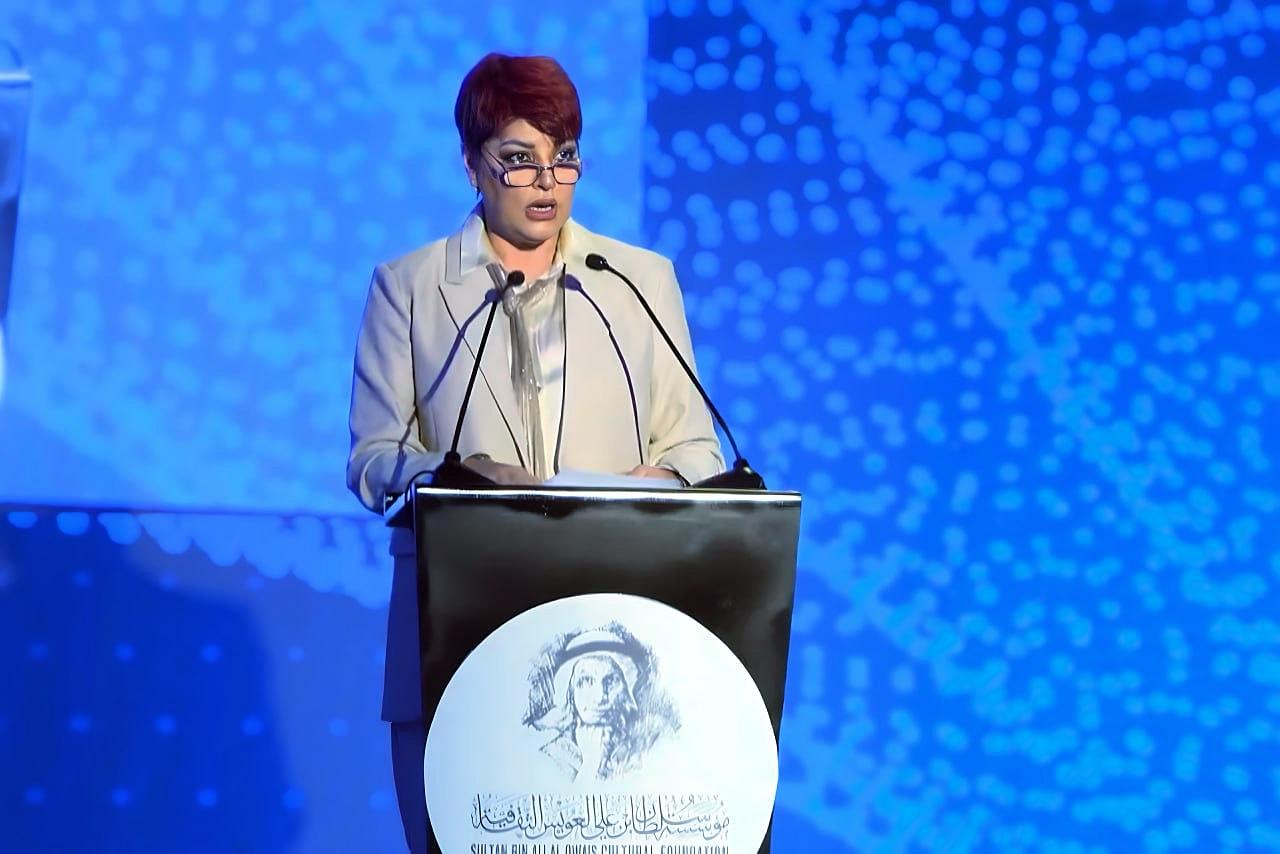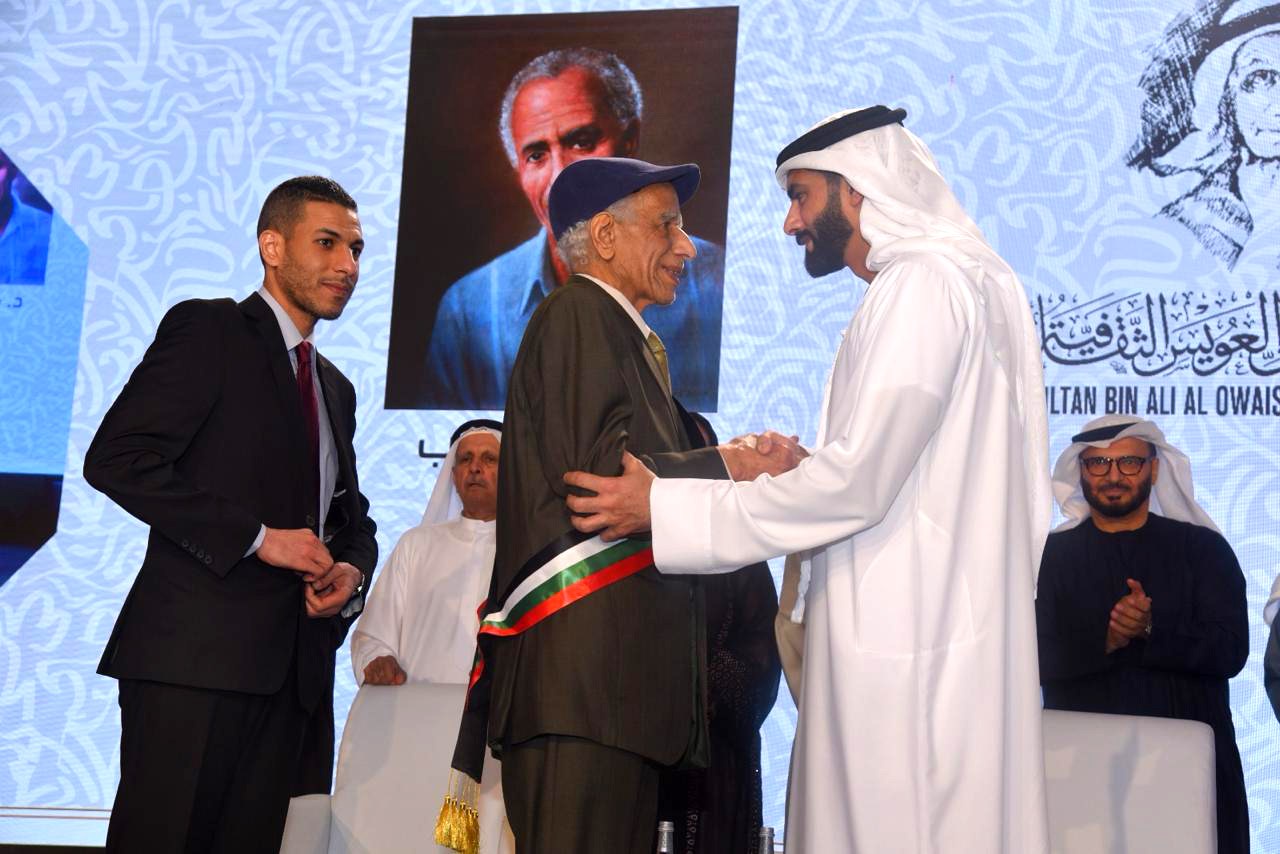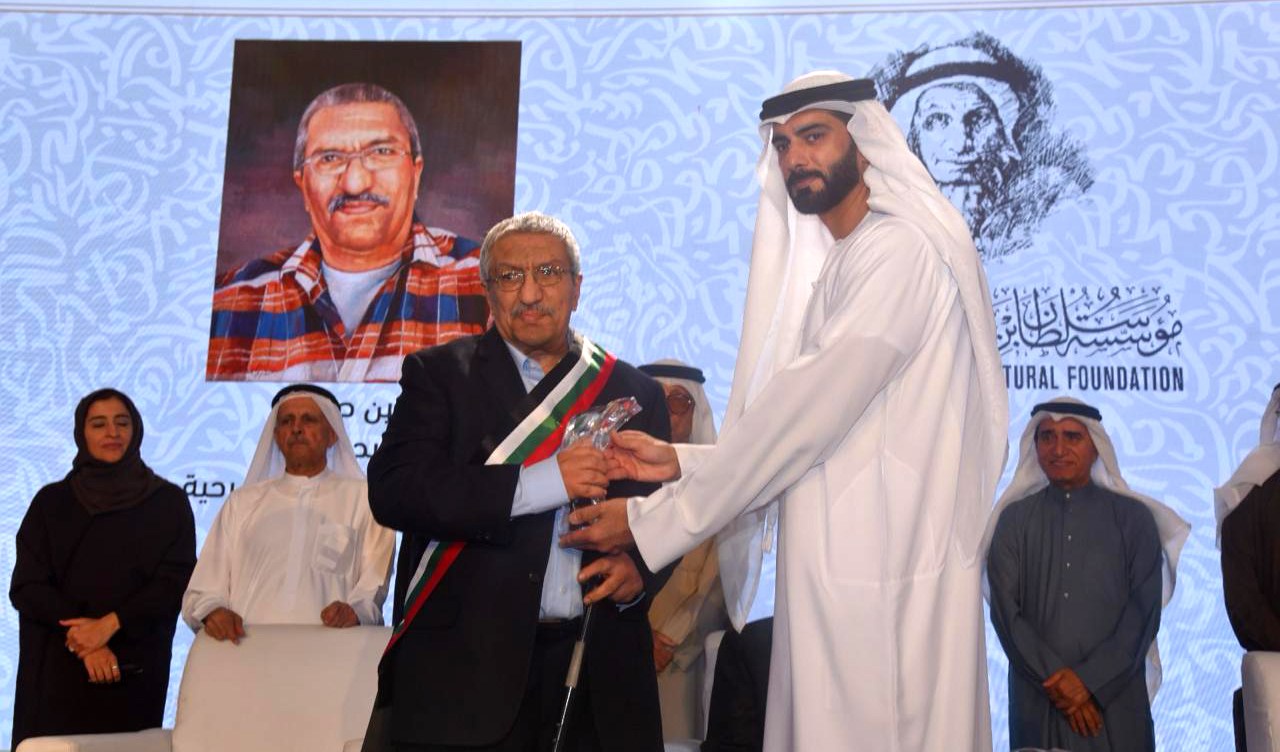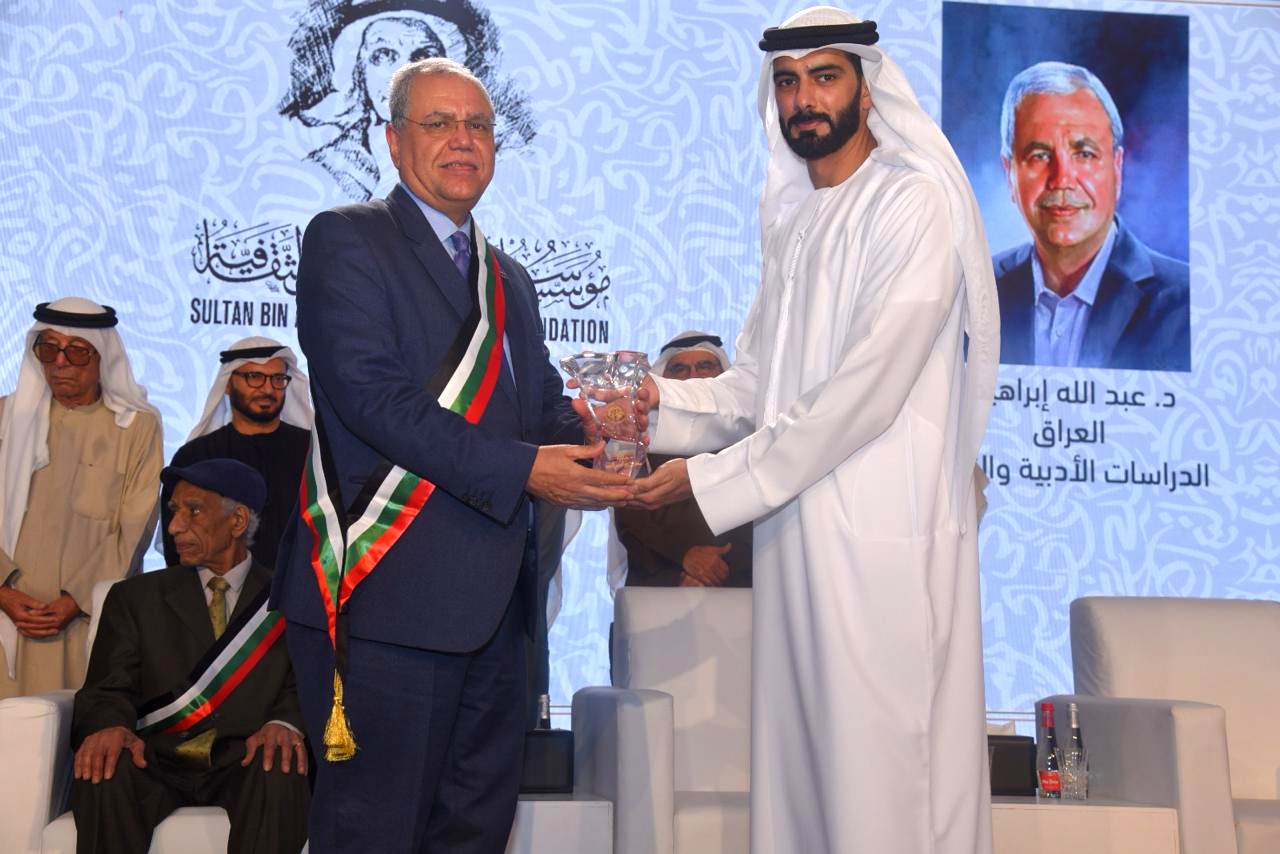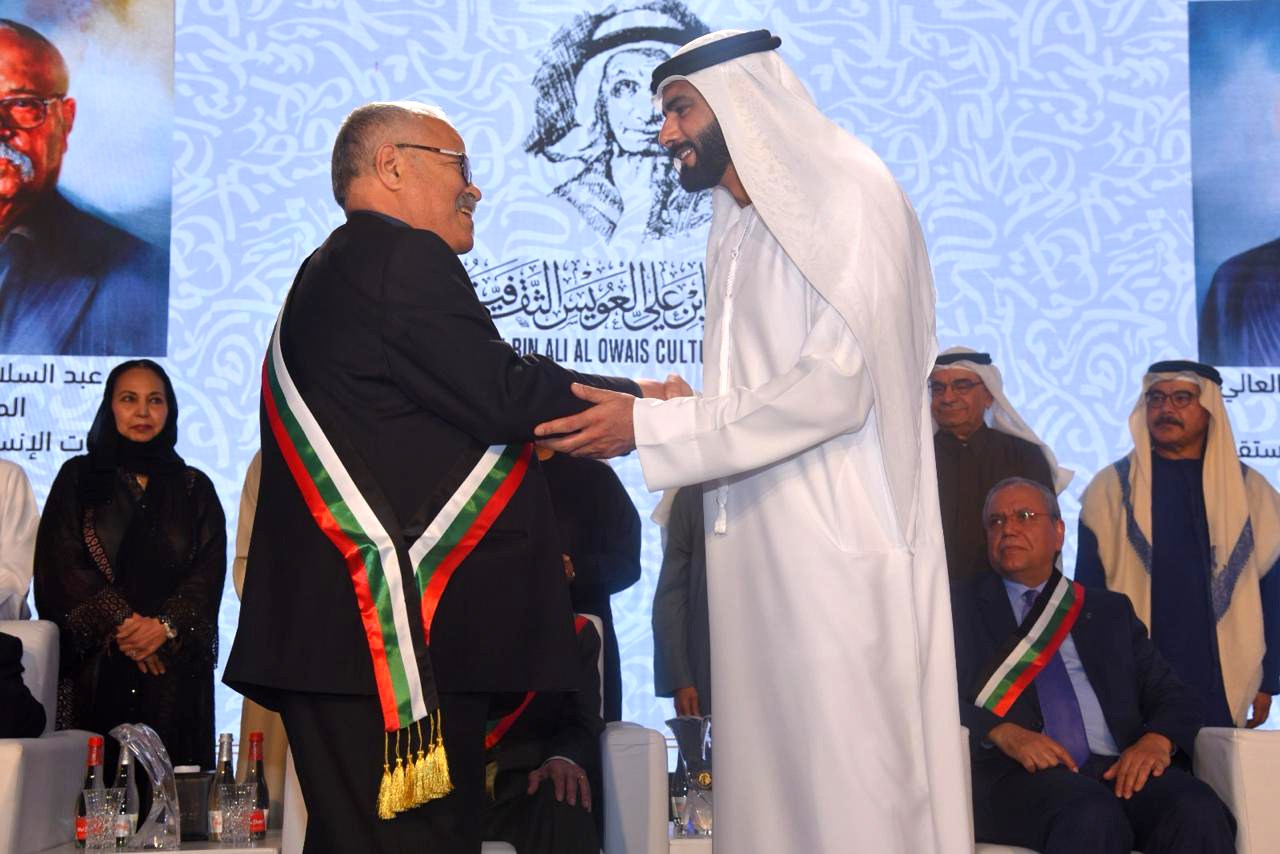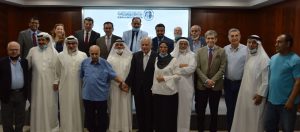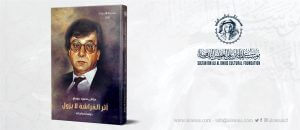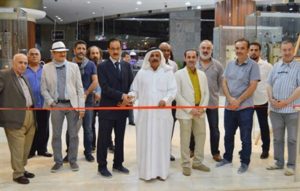The Sultan Bin Ali Al Owais Cultural Foundation honoured the winners of the 18th edition of the Sultan Bin Ali Al Owais Cultural Award (2022-2023) at a glittering awards ceremony held on Thursday evening, February 29, 2024.
The awards ceremony took place in the esteemed presence of Sheikh Salem Bin Khalid Al Qasimi, Minister of Culture, Dr. Anwar Mohammed Gargash, Chairman of the Foundation’s Board of Trustees, and Mohammed Al Murr, Chairman of the Board of Trustees of the Mohammed Bin Rashid Library. Among the distinguished attendees were the Secretaries General of the King Faisal Prize and Abdul Hameed Shoman Award, alongside numerous eminent Emirati and Arab cultural and intellectual figures, as well as a multitude of the Foundation’s esteemed guests.
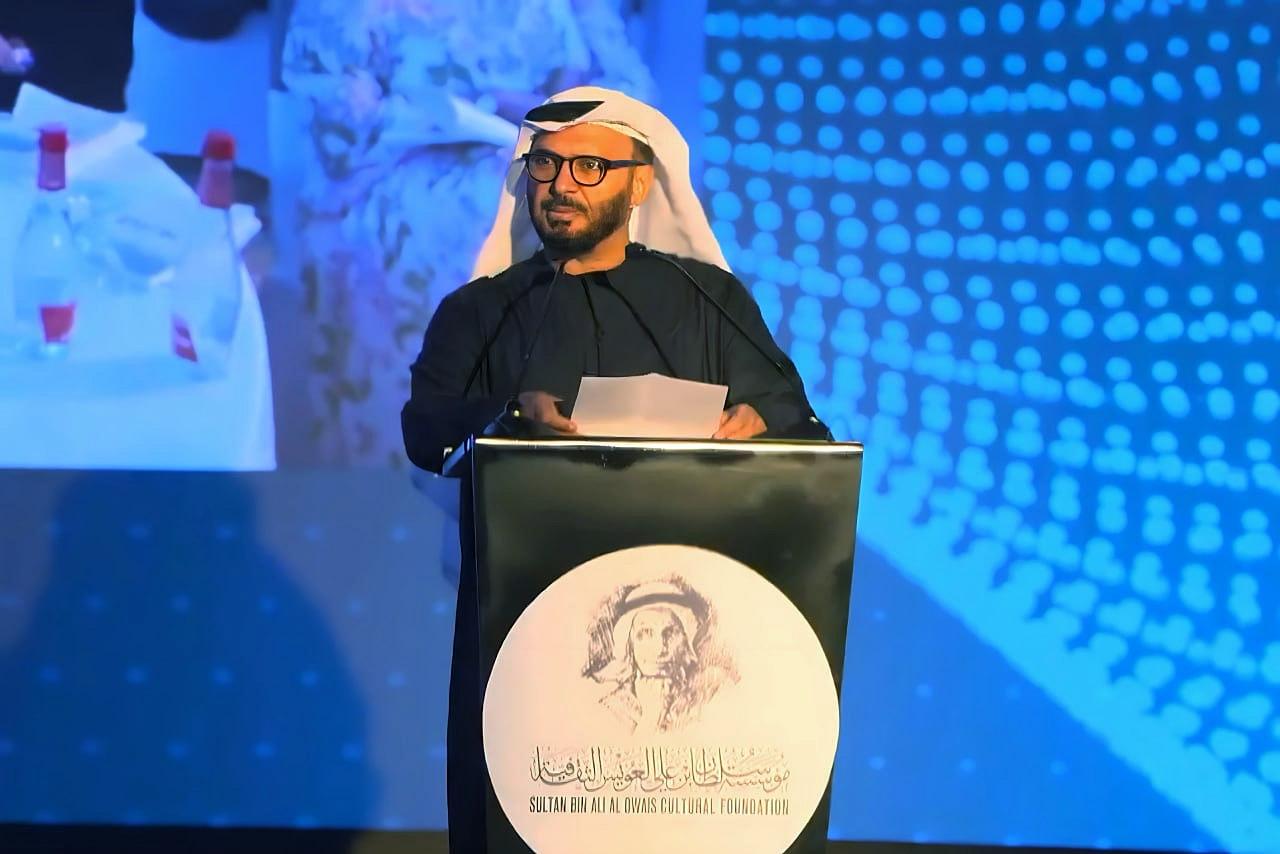
The winners of the 18th edition of the Sultan Bin Ali Al Owais Cultural Award include Egyptian poet Hassan Talab, Bahraini storyteller and novelist Amin Saleh, Iraqi critic Dr. Abdullah Ibrahim, and Moroccan thinker and translator Abdul Salam Benabdelali.
Dr. Anwar Mohammed Gargash, Chairman of the Award’s Board of Trustees, delivered a welcoming speech on the occasion. “On behalf of the Board of Trustees of the Sultan Bin Ali Al Owais Cultural Foundation, I am pleased to welcome you to this ceremony, at which we gather to honour a new group of creative figures who have significantly enriched the Arab knowledge and cultural landscape with their outstanding ideas and contributions.
In this context, I cannot fail to refer to the extraordinary and challenging humanitarian situation facing our brothers in Gaza, reaffirming the unwavering solidarity of the UAE’s leadership and people with them, as well as their ongoing support to alleviate their suffering. We earnestly hope that collective Arab efforts and the conscience of humanity will be combined to ensure that peace and stability will prevail. It is our fervent wish that our Palestinian brethren will ultimately enjoy their right to an independent and sovereign state after their long suffering.”
Distinguished guests,
Culture serves as the soul through which civilizations thrive, shaping the identity and uniqueness of nations and peoples alike. Culture fosters understanding and communication between people, laying the foundation for coexistence and openness in a world bursting with diverse cultures and creations.
The UAE has long recognized culture and creativity as essential drivers of development and progress. Creative individuals and intellectuals have consistently been valued and revered within our society. Therefore, the Sultan Bin Ali Al Owais Cultural Foundation has proudly taken the initiative to honor and celebrate them. Nations that pay homage to their creative minds and intellectuals are indeed vibrant societies poised for sustained growth and prosperity.
Today, as a continuation of the Al Owais Cultural Foundation’s journey of commitment to celebrating creative individuals, we extend a warm welcome to the winners of the award: poet Hassan Talab, critic Abdullah Ibrahim, storyteller Amin Saleh, and thinker Abdul Salam Benabdelali who are honored by the Al Owais Award and welcomed and embraced by the UAE.
Brothers and sisters,
At the Sultan Bin Ali Al Owais Cultural Foundation, we have consistently remained attuned to the vibrant landscape of Arab creative endeavors, driven by enduring values inherited from our esteemed founding fathers, who recognize culture as an indispensable catalyst for societal growth and advancement. Embracing this perspective, we endeavor to cultivate wide-ranging avenues for renaissance and development within our society.
I recall here the merits and qualities of the late Sultan Bin Ali Al Owais, who provided a proud model for the educated businessman who is aware of the importance of culture and thought and the need to support creative and distinguished people.
Here, I am reminded of the virtues and qualities of the late Sultan Bin Ali Al Owais, who epitomized a cherished proud model of the enlightened businessman, who recognized the significance of culture and thought and the imperative to support creative and distinguished individuals. The late Sultan Al Owais was a true example and a role model for businessmen and the private sector and motivate them to enrich the cultural and intellectual movement.
Ladies and gentlemen
“We, as the Board of Trustees, will remain committed to preserving the preserving the accomplishments attained by the Foundation, drawing its strength and influence from the UAE’s pioneering experience, forward-thinking approach and developmental paradigm championed by the wise leadership of President His Highness Sheikh Mohamed bin Zayed Al Nahyan.
The UAE has made significant contributions to culture and intellectual scene at the Arab and international levels, whether through bolstering cultural and scientific institutions or supporting intellectuals and creative individuals, fostering an environment conducive to cultural innovation across all facets. These efforts aim to ensure that the UAE remains to serve as an oasis of excellence and creativity.”
Dr. Abdullh Ibrahim read the winners’ speech, in which he said: “The winners of the 18th edition of the 2022-2023 Sultan Al Owais Cultural Award authorized me to speak to you on their behalf. Today, I stand here to first greet you at this joyful ceremony, and secondly to invoke Allah’s blessings and mercy upon the late Sultan bin Ali Al Owais, the esteemed founder of the award. Thirdly, I sincerely thank those in charge of the award, starting with its esteemed Board of Trustees, continuing through the diligent judging committees, and concluding with the dedicated executive management entrusted with its administration.
I am compelled to convey, through the voices of the laureates, the profound impact that this award has had within the Arab cultural sphere, solidifying its distinct identity since its inaugural session in 1988. Throughout its journey, the award has remained steadfast in fulfilling its noble mission: to inspire and honour Arab authors, writers, thinkers, and scientists, recognizing their pivotal contributions to the intellectual and scientific advancement across culture, literature, and science in the Arab world.
A thorough examination of the award’s declared objective over the past 35 years unequivocally underscores the alignment between its mission and the tangible outcomes it has yielded. The award has not merely espoused lofty ideals in rhetoric; rather, its actions have spoken volumes. Over the years, the award has become synonymous with excellence, attracting a cohort of the finest Arab writers and thinkers whose profound influence has invigorated the creative and cultural landscape. With over one hundred laureates to date, the award stands as a testament to its enduring legacy and far-reaching impact.”
Dr. Abdullah Ibrahim further emphasized, “Acknowledgment is an inherent trait of human nature, and the Sultan Al Owais Cultural Award has adeptly identified and honored exceptional Arabs who have made significant contributions to Arab culture. In turn, the laureates have reciprocated this recognition by enriching the award’s esteemed legacy with their momentous and invaluable works. This reciprocal recognition between the award and its recipients is unparalleled and undisputed.
The award has demonstrated boldness in its pursuit of deserving candidates, adhering steadfastly to its primary objective of honoring excellence. True prestige lies in being bestowed upon the most deserving individuals, devoid of favoritism or appeasement. The award’s integrity lies in its unwavering commitment to its mission, navigating its path with patience, expertise, and perseverance.”
In conclusion, Dr. Abdullah Ibrahim affirmed, “I bear witness that I have never encountered any doubts regarding the integrity of this award, nor of those entrusted with its stewardship. It is incumbent upon us, and others alike, to extend our heartfelt gratitude to those responsible for upholding its esteemed legacy and to bolster their resolve in perpetuating the solid traditions they have established. This is in fulfillment of the award’s overarching objective, in reverence of its esteemed founder, and as a reaffirmation of its storied history. Such is my earnest aspiration, and the collective hope of individuals such as myself.”
Following Dr. Abdullah Ibrahim’s remarks, Dr. Maisa Al Khawaja, a member of the jury, presented the committee’s report, stating: “The jury of the Sultan Bin Ali Al Owais Cultural Award convened for its 18th edition (2022-2023) in Dubai, from October 10 to 11, 2023. Under the chairmanship of the Foundation’s Secretary-General, Abdul Hamid Ahmed, and in the esteemed presence of the members of the General Secretariat, as well as all members of the respective jury committees.”
The members of the juries are Dr. Eskandar Habash, Dr. Habib Buhru, Dr. Hussein Hamouda, Dr. Sabri Mussallem, Dr. AbdulKhaleq Abdullah, Dr. Abdul Rahman Bu Ali, Dr. Mohammed Abdul Karim Hourani, Dr. Mohammed Lotfi Al Yousufi, Dr. Mariam Al Hashemi, Dr. Maisa Al Khawaja, Dr. Niveen Musaad, and Dr. Yousef Hittini.
After careful deliberation and discussion, the jury reached the following conclusions:
- First: Poetry:
unanimously decided to bestow the award upon poet Hassan Talab. His work stood out for its unparalleled uniqueness, richness, and diversity. The committee noted the presence of a cohesive and evolving poetic oeuvre characterized by its innovative blend of poetry, Sufism, and philosophical insights. Hassan Talab’s poetry demonstrates a keen exploration of language, experimenting with its nuances and pushing its boundaries to their fullest extent. His poems are crafted with a subjective approach, combining visual aesthetics with the phonetic essence of words and letters. Moreover, he boldly questions language itself, seeking to unearth its inherent potential and infuse his verses with luminosity. Through his mastery of rhythm in its myriad forms, the poet redefines the relationship with human heritage, presenting poetry in a fresh and revitalized manner.
- Second: Story, Novel, and Play:
The jury decided to honour storyteller Amin Saleh with the award in this category. Amin Saleh’s creative journey is distinguished by its remarkable diversity and cultural breadth, evident in his collection of short stories, texts, and other literary works. His writing style adeptly combines narrative and poetic elements, achieving a harmonious balance essential to this genre of creative expression. Amin Saleh consistently explores innovative narrative techniques, often opting for unconventional storytelling approaches to captivate his audience. He demonstrates a deliberate avoidance of clichés and repetitions, instead opting for fresh and novel perspectives. Additionally, Saleh draws inspiration from surrealism and employs various cinematic techniques in his creative endeavours, enriching his literary project with depth and imagination.
- Third: Literary Studies and Criticism:
The jury decided to bestow the award upon critic Abdullah Ibrahim whose writings are distinguished by their lucid methodological framework and profound engagement with the Arab narrative, its evolution, and contextual shifts. His work delves into cultural complexities and intricacies, offering insightful reflections on the dynamic interplay between East and West. Ibrahim’s critical writings have significantly expanded the scope of literary discourse, enriching our understanding of cultural phenomena. This led to the expansion of critical writing, becoming a cultural knowledge pit that dismantles the sayings, theses, cultural patterns and prevailing intellectual concepts, in an important product that has grown steadily and continuous work and represented in presenting an integrated critical project.
- Fourth: Humanities and Future Studies:
The jury decided to grant the “Humanities and Future Studies” Award to Dr. Abdul Salam Benabdelali who stands as a trailblazer in the deconstructive school of thought within Arab culture, viewing literature, writing, and translation as pivotal gateways to philosophical inquiry. His scholarly endeavors are marked by a lucid writing style that bridges the gap between specialists and non-specialists alike. His ideas exhibit a remarkable coherence, interdependence, and complementarity, akin to the construction of a multi-layered structure. Dr. Abdelali is a prolific researcher who adeptly connects philosophical discourse with societal realities, engaging with issues of development and contemporary challenges. His intellectual contributions are characterized by originality and sustained inquiry, making invaluable contributions to the field of humanities and future studies.
The honoring ceremony commenced with Sheikh Salem bin Khalid Al Qasimi, Minister of Culture, presenting the crystal shields to the winners in the esteemed presence of the members of the Foundation’s Board of Trustees. Sheikh Salem extended his heartfelt congratulations to the winners. Later, group memorial photos were taken to commemorate the occasion.
In total, there were 1,861 candidates across all fields, with 231 candidates vying for the “Poetry Award,” 490 candidates for the “Story, Novel, and Play” category, 290 candidates for “Literary Studies and Criticism,” 485 candidates for “Humanities and Future Studies,” and 270 candidates for “Scientific Cultural Achievement”.
Throughout the previous editions, a total of 101 Arab writers, authors, and intellectuals, alongside five esteemed cultural institutions dedicated to the advancement of culture and knowledge, have been honored with the award.
Additionally, over 270 arbitrators and consultants from diverse cultural backgrounds have adjudicated in the award’s respective fields. A cash prize of $120,000 is given to each field of the award.

